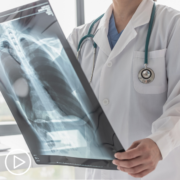What Impact Does the VA Have on Lung Cancer Care Coordination?
What Impact Does the VA Have on Lung Cancer Care Coordination? from Patient Empowerment Network on Vimeo.
How does the Veterans Health Administration impact lung cancer care coordination? Expert Dr. Michael Kelley from Duke University School of Medicine explains the different ways that veterans may receive lung cancer care and proactive patient advice to ensure all healthcare team members receive vital information.
[ACT]IVATION TIP
“…make sure that your providers are aware that you’ve had a test and that you see the results of that test, so that that way, you know that the test was done, and somebody has a report, and that way it’s more likely that that is going to be in front of your providers.”
Download Resource Guide | Descargar guía de recursos
See More from [ACT]IVATED NSCLC Veterans
Related Resources:

Explaining Advanced Non-Small Cell Lung Cancer to Veterans and Their Families |

|

What Should Veterans Know About Lung Cancer Screening and Risk? |
Transcript:
Lisa Hatfield:
Dr. Kelley, how does the coordination of care within the Veterans Health Administration impact the treatment outcomes for veterans with lung cancer? And are there any barriers patients’ families should be aware of?
Dr. Michael Kelley:
So many types of lung cancers need to be treated in a way which involves different members of the healthcare team, and that care needs to be coordinated especially when part of the care is being received in different health systems. So part of it may be in the VA and part of it outside the VA, or if the patient’s not receiving any care within the VA, then there may be multiple different medical institutions which are contributing to the patient’s care, and that care needs to be coordinated and communicated.
So when you have a test in one location, those results need to get to everyone else who’s involved in that patient’s care. So very important. We don’t make good medical decisions if we don’t have the best information about the patient, all the tests that were done. So my activation tip is, is to make sure that your providers are aware that you’ve had a test and that you see the results of that test, so that that way, you know that the test was done, and somebody has a report, and that way it’s more likely that that is going to be in front of your providers.
Share Your Feedback
Create your own user feedback survey










